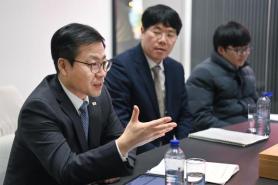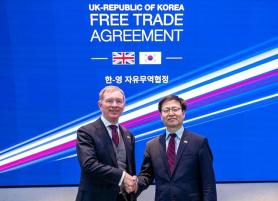![Containers stacked at Pyeongtaek Port in South Korea [Photo=Yonhap News]](https://image.ajunews.com/content/image/2025/09/30/20250930002403129001.jpg)
Editor’s Note: Aju Business Daily is publishing a special series to mark the 60th anniversary of the normalization of diplomatic ties between South Korea and Japan. The series reflects on the renewed relationship between the two neighbors.
SEOUL, October 01 (AJP) - Facing growing protectionist pressures from Washington, South Korea is under increasing pressure to deepen economic ties with Japan as the two countries mark 60 years of diplomatic relations.
Calls are mounting for a revival of talks on a long-stalled bilateral free trade agreement, though many in Seoul argue that joining a broader regional pact should take priority.
Negotiations on a South Korea-Japan free trade deal have been frozen since 2012, hampered by decades of economic rivalry and unresolved historical issues.
The debate has gained urgency after President Lee Jae Myung returned from the United Nations General Assembly in New York last month without progress on U.S. tariff disputes. South Korea’s trade minister, Yeo Han-gu, also met with U.S. Trade Representative Jamieson Greer, but the talks ended without a breakthrough.
The lack of progress with Washington has prompted calls for a “Plan B.” But an FTA with Japan would not be without costs: South Korea has never recorded a trade surplus with its neighbor since relations were normalized in 1965, and over the past five years alone, it has posted a deficit of $88.6 billion.
The Korea Institute for Industrial Economics and Trade has cautioned that a bilateral pact could deepen that imbalance, particularly through rising imports of automobiles, petrochemicals and electronics.
Instead, many economists and officials are looking toward the Comprehensive and Progressive Agreement for Trans-Pacific Partnership, a Japan-led trade bloc that includes 12 countries such as Australia, Canada and Britain and accounts for 15 percent of global GDP. Deputy Prime Minister Koo Yoon-cheol recently said Seoul would explore membership, while Trade Minister Yeo has held talks with counterparts from Australia, New Zealand and Indonesia.
Joining the pact would open South Korean exporters to markets such as Mexico, which is preparing to levy tariffs as high as 50 percent and with which Seoul has no bilateral free trade deal. Analysts say the benefits could outweigh those of a narrower Japan pact.
“Evaluating the need for a South Korea-Japan FTA after joining the CPTPP is not too late,” said Jeong Seong-chun, a senior researcher at the Korea Institute for International Economic Policy.
But hurdles remain steep. Domestic opposition, particularly from farmers worried about foreign competition, is strong. Membership requires unanimous consent from current members, and Japan has signaled it could use its leverage to press Seoul to resume imports of Japanese seafood — a sensitive issue tied to lingering fears over contamination from the Fukushima nuclear disaster.
Still, analysts say the shifting trade environment may leave Seoul with little choice. With Washington doubling down on tariffs and supply chain controls, South Korea’s options may hinge less on resolving bilateral disputes with the United States than on securing a place in the regional trade architecture that Tokyo now leads.
* This article, published by Aju Business Daily, was translated by AI and edited by AJP.
Copyright ⓒ Aju Press All rights reserved.




